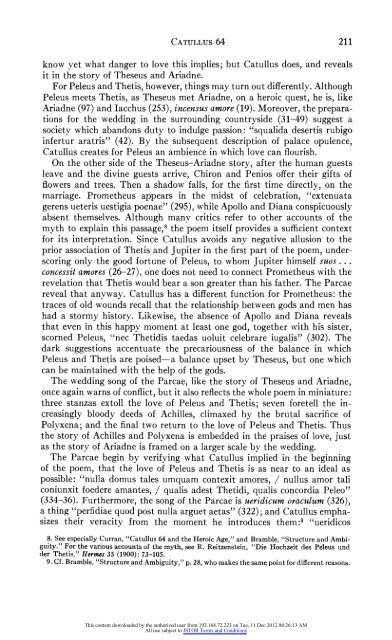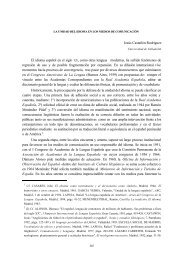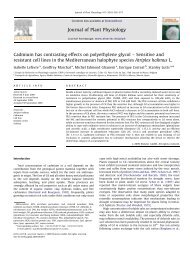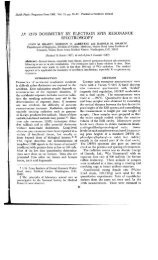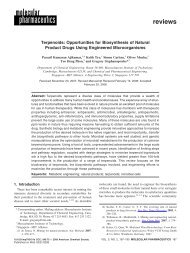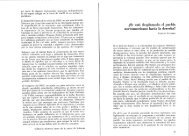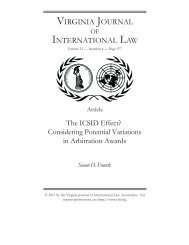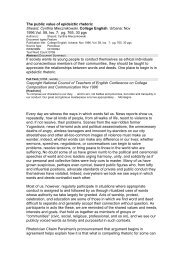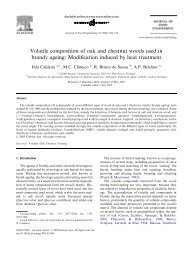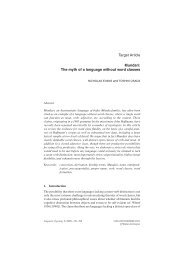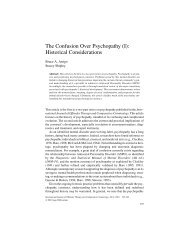Catullus 64 and the Conflict between A mores and Virtutes
Catullus 64 and the Conflict between A mores and Virtutes
Catullus 64 and the Conflict between A mores and Virtutes
Create successful ePaper yourself
Turn your PDF publications into a flip-book with our unique Google optimized e-Paper software.
CATULLUS <strong>64</strong> 211<br />
know vet what danger to love this implies; but <strong>Catullus</strong> does, <strong>and</strong> reveals<br />
it in <strong>the</strong> story of Theseus <strong>and</strong> Ariadne.<br />
For Peleus <strong>and</strong> Thetis, however, things may turn out differentlv. Although<br />
Peleus meets Thetis, as Theseus met Ariadne, on a heroic quest, he is, like<br />
Ariadne (97) <strong>and</strong> Iacchus (253), incensus amore (19). Moreover, <strong>the</strong> preparations<br />
for <strong>the</strong> wedding in <strong>the</strong> surrounding countryside (31-49) suggest a<br />
society which ab<strong>and</strong>ons duty to indulge passion: "squalida desertis rubigo<br />
infertur aratris" (42). By <strong>the</strong> subsequent description of palace opulence,<br />
<strong>Catullus</strong> creates for Peleus an ambience in which love can flourish.<br />
On <strong>the</strong> o<strong>the</strong>r side of <strong>the</strong> Theseus-Ariadne story, after <strong>the</strong> human guests<br />
leave <strong>and</strong> <strong>the</strong> divine guests arrive, Chiron <strong>and</strong> Penios offer <strong>the</strong>ir gifts of<br />
flowers <strong>and</strong> trees. Then a shadow falls, for <strong>the</strong> first time directly, on <strong>the</strong><br />
marriage. Prome<strong>the</strong>us appears in <strong>the</strong> midst of celebration, "extenuata<br />
gerens ueteris uestigia poenae" (295), while Apollo <strong>and</strong> Diana conspicuously<br />
absent <strong>the</strong>mselves. Although manv critics refer to o<strong>the</strong>r accounts of <strong>the</strong><br />
myth to explain this passage,8 <strong>the</strong> poem itself provides a sufficient context<br />
for its interpretation. Since <strong>Catullus</strong> avoids anv negative allusion to <strong>the</strong><br />
prior association of Thetis <strong>and</strong> Jupiter in <strong>the</strong> first part of <strong>the</strong> poem, underscoring<br />
only <strong>the</strong> good fortune of Peleus, to whom Jupiter himself suos...<br />
concessit a<strong>mores</strong> (26-27), one does not need to connect Prome<strong>the</strong>us with <strong>the</strong><br />
revelation that Thetis would bear a son greater than his fa<strong>the</strong>r. The Parcae<br />
reveal that anvway. <strong>Catullus</strong> has a different function for Prome<strong>the</strong>us: <strong>the</strong><br />
traces of old wounds recall that <strong>the</strong> relationship <strong>between</strong> gods <strong>and</strong> men has<br />
had a stormy historv. Likewise, <strong>the</strong> absence of Apollo <strong>and</strong> Diana reveals<br />
that even in this happy moment at least one god, toge<strong>the</strong>r with his sister,<br />
scorned Pelets, "nec Thetidis taedas uoluit celebrare iugalis" (302). The<br />
dark suggestions accentuate <strong>the</strong> precariousness of <strong>the</strong> balance in which<br />
Peleus <strong>and</strong> Thetis are poised a balance upset by Theseus, but one which<br />
can be maintained with <strong>the</strong> help of <strong>the</strong> gods.<br />
The wedding song of <strong>the</strong> Parcae, like <strong>the</strong> story of Theseus <strong>and</strong> Ariadne,<br />
once again warns of conflict, but it also reflects <strong>the</strong> whole poem in miniature:<br />
three stanzas extoll <strong>the</strong> love of Peleus <strong>and</strong> Thetis; seven foretell <strong>the</strong> increasingly<br />
bloody deeds of Achilles, climaxed by <strong>the</strong> bruLtal sacrifice of<br />
Polvxena; <strong>and</strong> <strong>the</strong> final two return to <strong>the</strong> love of Peleus <strong>and</strong> Thetis. Thus<br />
<strong>the</strong> story of Achilles <strong>and</strong> Polyxena is embedded in <strong>the</strong> praises of love, just<br />
as <strong>the</strong> story of Ariadne is framed on a larger scale by <strong>the</strong> wedding.<br />
The Parcae begin by verifying what <strong>Catullus</strong> implied in <strong>the</strong> beginning<br />
of <strong>the</strong> poem, that <strong>the</strong> love of Peleus <strong>and</strong> Thetis is as near to an ideal as<br />
possible: "nulla domus tales umquam contexit a<strong>mores</strong>, / nullus amor tali<br />
coniunxit foedere amantes, ,/ qualis adest Thetidi, qualis concordia Peleo"<br />
(334-36). Fur<strong>the</strong>rmore, <strong>the</strong> song of <strong>the</strong> Parcae is ueridicum oraculum (326),<br />
a thing "perfidiae quod post nulla arguet aetas" (322); <strong>and</strong> <strong>Catullus</strong> emphasizes<br />
<strong>the</strong>ir veracity from <strong>the</strong> moment he introduces <strong>the</strong>m:9 "ueridicos<br />
8. See especially Curran, "<strong>Catullus</strong> <strong>64</strong> <strong>and</strong> <strong>the</strong> Heroic Age," <strong>and</strong> Bramble, "Structure <strong>and</strong> Ambi-<br />
guity." For <strong>the</strong> various accounts of <strong>the</strong> myth, see R. Reitzenstein, "Die Hochzeit des Peleus und<br />
der Thetis," Hermes 35 (1900): 73-105.<br />
9. Cf. Bramble, "Structure <strong>and</strong> Ambiguity," p. 28, who makes <strong>the</strong> same point for different reasons.<br />
This content downloaded by <strong>the</strong> authorized user from 192.168.72.223 on Tue, 11 Dec 2012 08:26:13 AM<br />
All use subject to JSTOR Terms <strong>and</strong> Conditions


